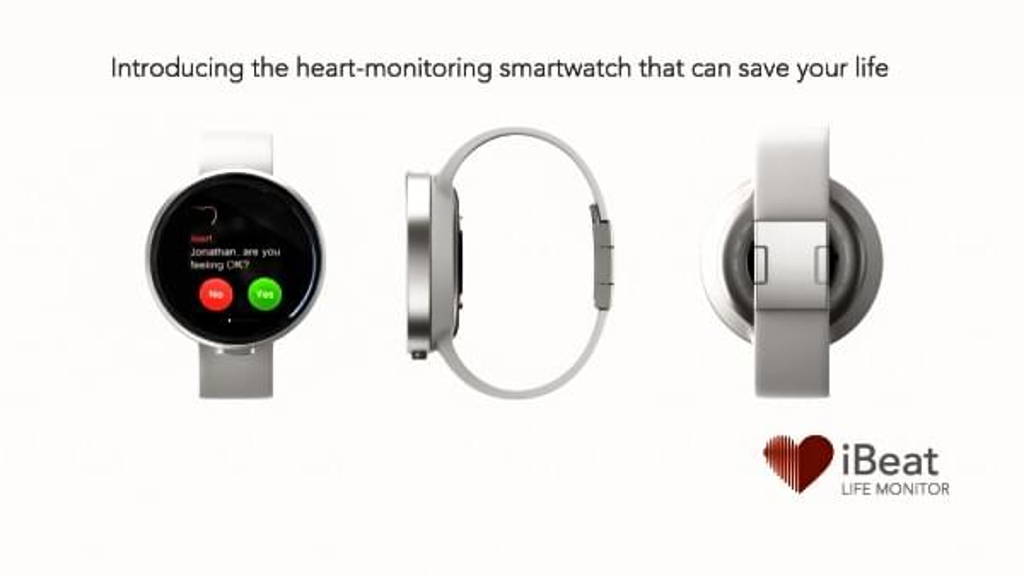Mehmet Oz, called America’s Doctor by many, joined with health tech startup iBeat to launch a heart monitoring smartwatch with the lofty goal of empowering people to live longer lives. The partnership with Dr. Oz will kick off with pre-orders for its iBeat Life Monitor – a watch that continuously monitors one’s heart for life threatening emergencies and notifies loved ones and emergency responders in such an event.
With sudden cardiac arrest being a leading cause of death in the United States, killing nearly 326,000 people a year, iBeat aims to give users and their loved ones peace of mind when it comes to monitoring and maintaining everyday heart health. Studies have shown daily heart monitoring is not only proven to help prevent stroke, but can also potentially reduce hospitalizations while delivering critical information to researchers and caregivers.
iBeat has already raised $1.5 million in funding from private investors and is looking to establish the market for the iBeat Life Monitor through pre-orders, as well as support the tooling and production line needed to bring the device to the masses. iBeat is now taking online pre-orders on Indiegogo for its heart monitoring smartwatch.
The iBeat Life Monitor differentiates itself from other wearables on the market by continuously monitoring and analyzing user’s heart activity and instantly detecting the signs of oncoming cardiac arrest (a sudden cessation of heart function), writes iBeat. When the device detects a problem, the watch sounds an alarm asking if the user is “OK”. If there’s no response or if the user does push the “No” button, the watch will dial emergency services and any family members programmed into the device.
All this can also be activated by the user holding down an emergency call button on the watch for at least two seconds. Since it has its own cellular connectivity built in, it doesn’t need a smartphone to operate. because there’s a GPS inside as well, it will provide the user’s location to emergency responders and family members to help speed up the response.
Users will also have access to an online dashboard where they can see their daily, weekly, and monthly overall heart health (beats per minutes, heart pattern changes, etc.) and compare it to others within their age range. The device is also equipped with an Emergency-On-Demand button which, when long-pressed for two seconds, will allow users to reach out to their emergency contacts, or if needed, 911.
The wearable supposedly is able to detect an oncoming cardiac arrest via photoplethysmography, a way of using a pulse oximeter to measure the variation of the blood volume in the distal vessels, and to extrapolate volume of blood pumped by the heart. Medgadget is a bit skeptical as this technology has its limitations, including accuracy problems during physical activity and measurements being affected by other physiological parameters such as breathing.
With sudden cardiac arrest being a leading cause of death in the United States, killing nearly 326,000 people a year, iBeat aims to give users and their loved ones peace of mind when it comes to monitoring and maintaining everyday heart health. Studies have shown daily heart monitoring is not only proven to help prevent stroke, but can also potentially reduce hospitalizations while delivering critical information to researchers and caregivers.
Active monitoring and alerting as USP’s
The health start-up is a brain child of Ryan Howard, the founder of Practice Fusion. Dr. Oz (cardiothoracic and transplant surgery) joined the company as special advisor after seeing the ‘massive impact potential of the iBeat technology’ in their San Francisco headquarters. A big USPversus other monitoring devices is supposed to be the active and continual monitoring of someones heart condition and actively alerting in case of cardia arrest.iBeat has already raised $1.5 million in funding from private investors and is looking to establish the market for the iBeat Life Monitor through pre-orders, as well as support the tooling and production line needed to bring the device to the masses. iBeat is now taking online pre-orders on Indiegogo for its heart monitoring smartwatch.
More observant role loved ones
The iBeat Life Monitor is designed to continuously measure and monitor one’s heart and potentially prevent fatal heart incidents.The medical-grade device provides users with a sense of safety and control over their own heart health –vital in the treatment and prevention of heart failure according to dr Oz - and allows their loved ones and family members to take a more observant role in their care as well.The iBeat Life Monitor differentiates itself from other wearables on the market by continuously monitoring and analyzing user’s heart activity and instantly detecting the signs of oncoming cardiac arrest (a sudden cessation of heart function), writes iBeat. When the device detects a problem, the watch sounds an alarm asking if the user is “OK”. If there’s no response or if the user does push the “No” button, the watch will dial emergency services and any family members programmed into the device.
All this can also be activated by the user holding down an emergency call button on the watch for at least two seconds. Since it has its own cellular connectivity built in, it doesn’t need a smartphone to operate. because there’s a GPS inside as well, it will provide the user’s location to emergency responders and family members to help speed up the response.
Users will also have access to an online dashboard where they can see their daily, weekly, and monthly overall heart health (beats per minutes, heart pattern changes, etc.) and compare it to others within their age range. The device is also equipped with an Emergency-On-Demand button which, when long-pressed for two seconds, will allow users to reach out to their emergency contacts, or if needed, 911.
Low survival rates
Dr. Oz, writes in Medgadget held a call with members of the media and highlighted that survival from cardiac arrest outside the hospital is quite low. He said that he’s optimistic the iBeat can dramatically change those odds, particularly for older people with diabetes, high blood pressure, and elevated cholesterol.The wearable supposedly is able to detect an oncoming cardiac arrest via photoplethysmography, a way of using a pulse oximeter to measure the variation of the blood volume in the distal vessels, and to extrapolate volume of blood pumped by the heart. Medgadget is a bit skeptical as this technology has its limitations, including accuracy problems during physical activity and measurements being affected by other physiological parameters such as breathing.








